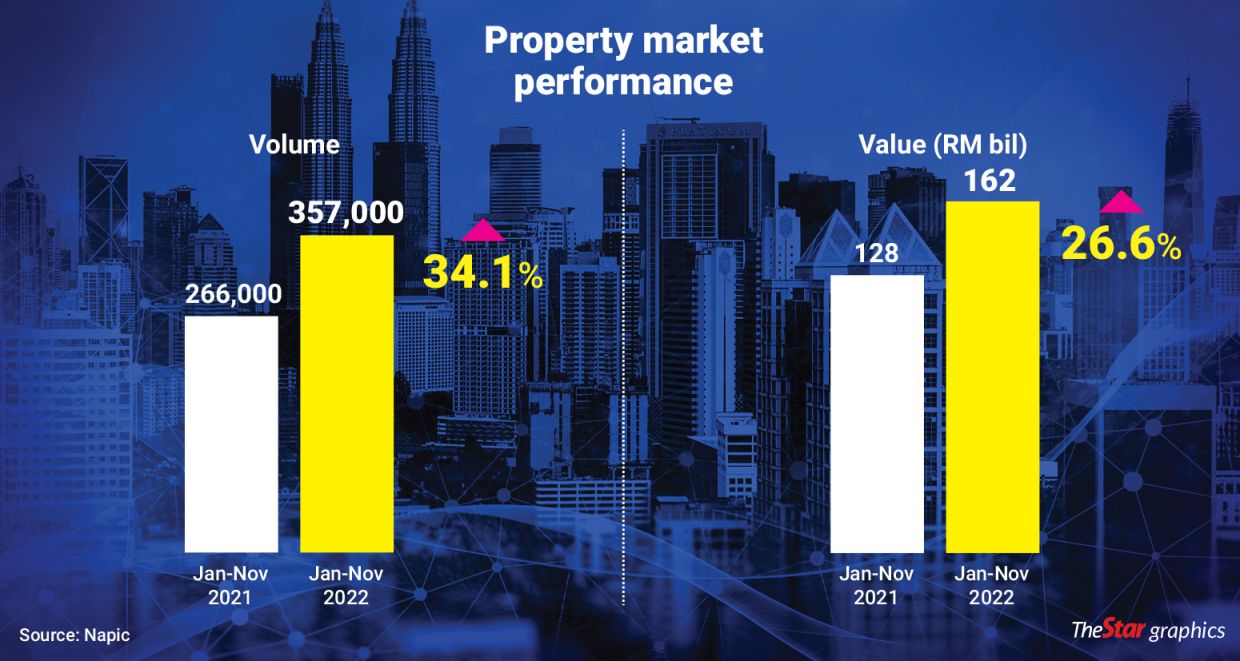Malaysia: Full recovery on the horizon
PETALING JAYA: The country’s property market is expected to recover to pre-pandemic levels by 2024, provided there are adequate government incentives, reforms and economic stability.
“A lot of international players are relooking our market. It will take time for the new government to introduce policies or reforms, but at the rate things are going, we expect the property market to recover by 2024,” said Association of Valuers, Property Managers, Estate Agents and Property Consultants in the Private Sector Malaysia (PEPS) executive committee member James Wong.
Based on National Property Information Centre (Napic) data, for the first 11 months of 2022, the country’s property market transactions volume jumped 34.1% to about 357,000 (from 266,000 transactions a year ago) while transactions value rose 26.6% to RM162bil (from RM128bil a year ago).
“Twenty twenty-three will be a year of consolidation for the property market. Napic figures show that volume and prices have increased, although there are many domestic and international headwinds. Also, Malaysia is unlikely to face a recession,” Wong, who is also director of property consultant VPC Alliance (KL) Sdn Bhd, told a media briefing during the 15th Malaysian Property Summit 2023 yesterday.
Also present was Napic director Aina Edayu Ahmad who said: “If you look at the data, market activity appears positive in 2022 although this has yet to bounce back to pre-pandemic level.”
On the country’s property overhang situation, Aina Edayu pointed out that there was a gradual improvement in the number of units absorbed by the market.
At the end of the third quarter of 2022 (3Q22), the country’s property overhang had dropped to 29,534 units (valued at RM20bil) compared with 34,092 units (valued at RM21.7bil) at the end of the first half of that year.
“We can see an improvement in terms of the numbers in the third quarter of 2022,” she noted.
A total of 7,040 units (or nearly 24%) are priced RM300,000 and below, 8,702 units (or 29.5%) are priced from RM300,001 to RM500,000 and 6,980 units (or nearly 24%) are priced RM500,001 to RM800,000.
According to Aina Edayu. the regions with highest property overhang were Johor (5,348 units); Penang (5,222 units), Selangor (4,386 units) and Kuala Lumpur (3,362 units).
She noted that an area of particular concern was the high number of “core overhang” units which remained unsold after five to 10 years of their launch.
In this category, Penang has the most units (at 3,931) followed by Johor (3,003), Kuala Lumpur (2,897) and Selangor (2,234).
“No market would absorb the numbers, if they have been there for more than five years.
“Something is not right about the projects – it could be the location, price or design,” she said.
On the revised Budget 2023 which is due to be retabled on Feb 24, Aina Edayu said the same incentives to spur the property market would likely remain.
“The housing segment is the core of the property industry,” she said.
In the old Budget 2023, houses worth RM500,000 to RM1mil were to have enjoyed an increase in stamp duty exemption from 50% to 75% until Dec 31, 2023.
Stamp duties for the transfer of property between families is subject to a stamp duty of RM10.
There was also an allocation for building new and renovating houses in rural areas which would have seen an increase from RM367mil to RM460mil.
A RM367mil allocation was originally provided for the People’s Housing Projects in urban areas, including new projects in Marang, Terengganu and Arau, Perlis which will benefit 12,400 people.
Also, 4,250 housing units worth RM358mil were to have been built under the Rumah Mesra Rakyat programme.
The 100% stamp duty exemption for first-time homeowners remains applicable for properties priced RM500,000 and below through the Keluarga Malaysia Home Ownership Initiative or i-Miliki initiative from June 1, 2022 to December 2023.
Meanwhile, Wong said among the PEPS wishlist for the revised budget is for the government to provide incentives for industrialised housing.
“Not many developers are moving into industrialised housing, due to the lack of economies of scale.
“Industrialised housing, if you build in great numbers, will be faster and more cost efficient compared with conventional housing,” he said.
PEPS executive committee member Datuk Siders Sittampalam said the government should also look into reducing compliance costs for property developers.
“There are many different authorities involved, in terms of approvals for property developments. Other than construction costs, this is one way which will help to bring down house prices,” he said.
Source: https://www.thestar.com.my/business/business-news/2023/02/09/full-recovery-on-the-horizon


 English
English





